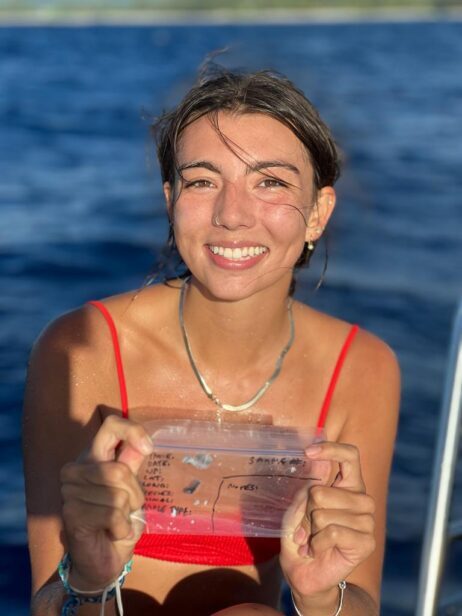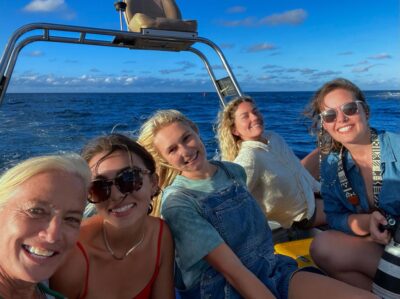You’d spent five hours on the boat, moving with and observing the behaviors of whales off the coast of Rarotonga. Very little water had been consumed. Your soggy egg sandwich had been scarfed down in haste, between futile attempts to collect the skin samples of three fighting male bulls. Participation in the demolition of a 2-liter tub of chocolate ice cream had, in turn, demolished your digestive tract, and you were feeling the repercussions.
You had watched, enthralled by the ecstasy of the presence of a wild new life, as a newborn calf joyfully breached along the reef break; its mother, protective and warding off the advances of an escort. The day had been long and windy, the only sun glinting through patches of clouds and reflecting pensively off inky blue water. It was beautiful, though like most beautiful things, it provided little warmth. Your guard down — tired, cold, and satiated by a full day’s work — you begin your journey back to port.
Nature always chooses to astonish when you least expect it: A whale, rising ethereally from the sea’s unbothered surface, careening itself heavenwards, the tip of its cranium seeming to graze the blazing edge of the sun — time tends to freeze for moments like these. One, two. And then, crash a gloriously auditory experience: giant cymbals of blubber on water create a cacophony that pinches you (the observer) back into reality’s timeline, just as the whale is sucked back into its physical form from its moment of inarticulable majesty by the sheer weight of its gravity. A sinking mass of chaos, pulling you down with it.
But remember, you are a researcher. Remember, while you remain slightly dislocated from your little crux of reality, you must find footing in the scientific method. Its construct provides mild comfort, a framework through which to understand this wonderous experience and consolidate it into part of the human experience. When a whale surfaces, the water where it had been becomes altered – smoothened — by its movement, leaving what is known as a footprint. You are looking for skin: little flakes that the whale had dislodged, just as you had been.
- Francesca after a wonderful day of so many whales that we lost count
- Ella with the whale skin DNA sample on ice
So, you jump into the expansive teal blue water, armed with a sample net and a snorkel. Swimming in the open ocean is akin to moving through a dimensionless space: there are no boundaries or landmarks, and again you feel yourself becoming increasingly disembodied, uprooted from time the further you swim. Flat, blue expanse consumes you, and not even the light seems to provide dimension. It’s terrifying and thrilling.
And then, in the footprint, skin falls like snow with nowhere to land. Grey and white flecks speckle your vision and a feeling of ecstasy ripples through your body. There, a large flake falls slowly towards nothing. But you will not let it escape you, this skin is grounding. This skin is important. This skin is a relic. Diving down net-first, you successfully collect it, sacrificing breath for skin — the burning in your lungs signifying a pilgrimage – this must be what it feels like to touch the shroud of Turin; the staff of Moses; the statue of Shiva.
You breach the surface of the water, human and holding the only tangible evidence of a fleeting transcendence.





